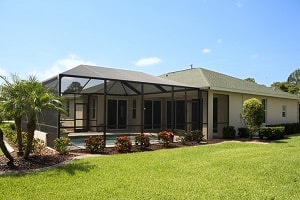Florida Homestead Law

In Florida, there are many benefits to turning your property into your Florida homestead. When you register your Florida home as a homestead, you are indicating that it is your primary personal residence. In the state of Florida, it is not unusual for families to own primary homes and vacation homes throughout the state. The Florida homestead laws allow a family to be able to receive certain financial and legal benefits when they establish their full-time personal dwelling.
The Criteria For Becoming A Homestead
There are three basic criteria your Florida home has to follow if you want to be able to register it as your homestead. The first is that you must have legal ownership of your property on January 1st of the year you register it as a homestead. If you bought your property on March 1st, then you would have to wait until the following year to register it as a homestead.
You must be able to prove that the home is your primary residence using a set of guidelines created by the state of Florida. It is important that you review these guidelines carefully because people who like to split their time between two or more homes might have to alter their lifestyle to qualify as a homestead.
The final criteria is that you must submit your application for being a homestead in person at your local county office between January 1st and March 1st. Any applications that are submitted after March 1st will not be considered for that year.
Ending Your Homestead Status
The state of Florida is adamant about homeowners ending their homestead status when they decide to move out of their primary residence. Once you register your property as a homestead, you will receive regular postcard reminders telling you that you must alert your county office if you intend to sell your home and end its homestead status.
Savings On Real Estate Taxes
A Florida homestead is eligible to take part in what winds up being a very substantial real estate tax savings program. Basically, the homestead laws say that your property taxes cannot increase by more than three percent per year, or the rate of change in the Consumer Price Index, whichever is less. For many homeowners, this can represent a savings of thousands of dollars each year on their real estate taxes.
In 2018, the Florida state legislature introduced a bill that would offer savings of $50,000.00 to $75,000.00 on property taxes of properties valued at $100,000.00 or more. The bill also wants to make properties valued from $100,000.00 to $125,000.00 free from paying any real estate taxes at all.
Protection From Creditor Actions
It is common for creditors seeking a judgement against a person to demand that the person’s home be liquidated to satisfy that judgement. When your home is officially registered as a Florida homestead, you do not have to liquidate your home to satisfy any creditor lawsuits or claims. However, claims against your house or property specifically, such as foreclosures or tax liens, are not part of this protection.
Transferring Ownership After You Die
To this point, the Florida homestead laws sound like they are extremely beneficial to homeowners. Not only does a homeowner enjoy a discount in their real estate taxes, but their home is protected from overzealous creditors trying to file lawsuits. But when it comes to the transfer of your homestead after you pass away, things can get a bit confusing.
Your ability to transfer ownership of your property after you pass away depends on your marital status and your status as a parent when you die. If you pass away with no spouse and no minor children, then Florida homestead laws allow you to transfer your property to anyone you like. But if you did not die single and without minor children, then the process can get confusing.
Adult Children
If you have an adult child, then you must transfer ownership of your homestead to that adult child. However, if you have more than one adult child, then you can choose to disinherit one of those children in lieu of transferring ownership to the other.
The Florida homestead laws actually do allow for some unique leeway when it comes to handling the transfer of your property to your adult children. If you want, you can disinherit all of your adult children and leave your property to a friend or one of your siblings.
Joint Title
If you are married when you pass away and you and your spouse are both on the title for the property and you have a minor child together, then the property would automatically transfer to your spouse.
Irrevocable Trust For A Minor Child
If you are not married when you pass away but you have a minor child, then you can set up an irrevocable trust that will determine at what age your minor child can take ownership of the property. It is important to remember that once you establish an irrevocable trust, it cannot be canceled or changed.
The Mattar Firm has many years of experience in handling Florida homestead laws and setting up irrevocable trusts to protect your minor children. We encourage you to give our understanding estate planning lawyers a call and let us review your situation today.
